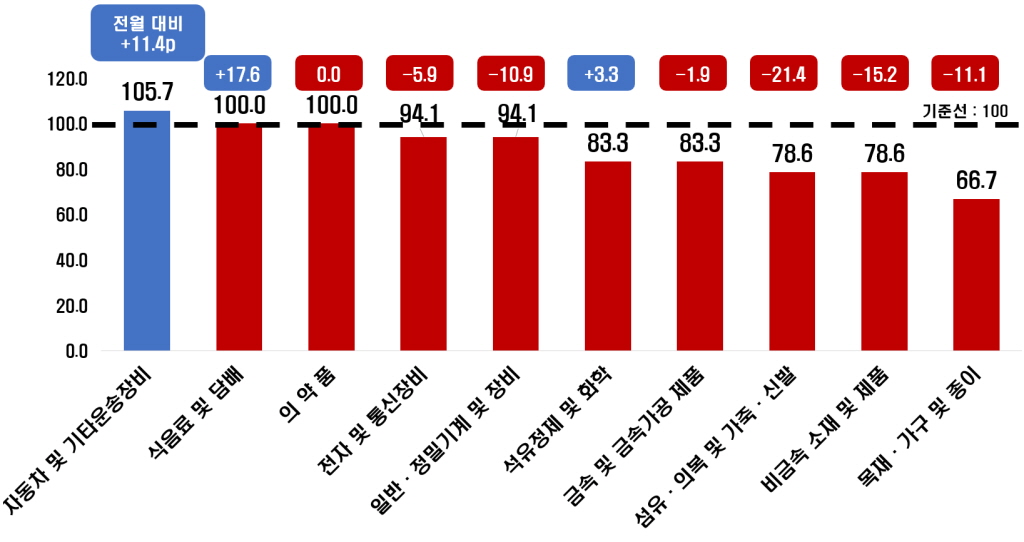한국경제인협회가 매출액 기준 600대 기업을 대상으로 기업경기실사지수(Business Survey Index)를 조사한 결과, 가전 등 소비재 수요 부진과 중국의 D램 생산능력 확대로 반도체 가격이 하락할 것으로 전망되며, 반도체 등 전자 및 통신장비의 경기 심리가 위축됐다.

▲제조업 세부업종 12월 전망 BSI
가전 등 소비재 수요 부진·中 D램 생산 확대 영향
가전 등 소비재 수요 부진과 중국의 D램 생산능력 확대로 반도체 가격이 하락할 것으로 전망되며, 반도체 등 전자 및 통신장비의 경기 심리가 위축됐다.
한국경제인협회가 매출액 기준 600대 기업을 대상으로 기업경기실사지수(Business Survey Index)를 조사한 결과, 2024년 12월 BSI 전망치는 97.3을 기록했다.
BSI 전망치가 2022년 4월 99.1을 기록한 후부터 기준선 100을 33개월 연속 하회한 것은 1975년 1월 기업경기동향조사(BSI)가 시작된 이래 역대 최장기 연속 부진이다.
12월 경기 전망은 업종별로 희비가 교차했다. 제조업 BSI은 89.9를 기록, 올해 7월(88.5) 이후 5개월 만에 90선을 밑돌았다.
한경협은 내수 침체 장기화의 영향으로 제조업 제품의 국내 공급이 5분기 연속 감소하는 등 제조업 경기심리가 악화되고 있다고 밝혔다.
반도체가 포함된 전자 및 통신장비(94.1)도 기준선을 하회했다.
이는 가전 등 소비재 수요 부진과 중국의 D램 생산능력 확대로 반도체 가격이 하락할 것으로 전망되며 경기심리가 위축됐다고 분석됐다.
제조업 세부 업종(총 10개) 중에서는 △자동차 및 기타운송장비(105.7)가 유일하게 호조 전망을 보였다.
기준선 100에 걸친 △식음료 및 담배(100.0) △의약품(100.0)을 제외한 제외한 △목재·가구 및 종이(66.7) △섬유·의복 및 가죽·신발(78.6) △비금속 소재 및 제품(78.6) △석유정제 및 화학(83.3) △금속 및 금속가공 제품(83.3) △전자 및 통신장비(94.1) △일반·정밀기계 및 장비(94.1) 등 나머지 7개 업종은 업황 악화가 전망된다.
비제조업 세부 업종(총 7개) 중에서는 △전기·가스·수도(126.3) △여가·숙박 및 외식(123.1) △전문, 과학·기술 및 사업지원서비스(116.7) △운수 및 창고(108.7)가 호조전망을 보였다. 기준선 100에 걸친△도·소매(100)를 제외한 정보통신 및 건설 등 2개 업종은 업황 악화가 전망된다.
이상호 한경협 경제산업본부장은 “대외리스크 확대와 내수 부진이 겹치면서 올해 3분기 국내 17개 산업 중 12개 영업이익이 감소 상태인 것으로 나타났다”며 “현재 우리 기업들은 경영실적 악화로 한계에 봉착한 것으로 보인다”고 우려했다.
